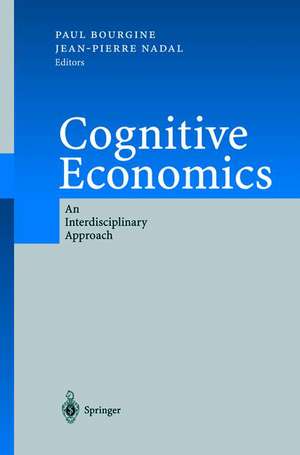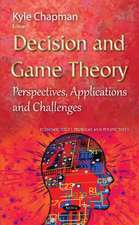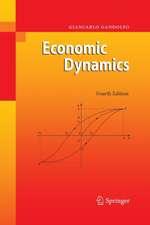Cognitive Economics: An Interdisciplinary Approach
Editat de Paul Bourgine, Jean-Pierre Nadalen Limba Engleză Hardback – 7 ian 2004
| Toate formatele și edițiile | Preț | Express |
|---|---|---|
| Paperback (1) | 1226.24 lei 6-8 săpt. | |
| Springer Berlin, Heidelberg – 29 noi 2010 | 1226.24 lei 6-8 săpt. | |
| Hardback (1) | 1232.57 lei 6-8 săpt. | |
| Springer Berlin, Heidelberg – 7 ian 2004 | 1232.57 lei 6-8 săpt. |
Preț: 1232.57 lei
Preț vechi: 1503.14 lei
-18% Nou
Puncte Express: 1849
Preț estimativ în valută:
235.86€ • 246.87$ • 196.30£
235.86€ • 246.87$ • 196.30£
Carte tipărită la comandă
Livrare economică 31 martie-14 aprilie
Preluare comenzi: 021 569.72.76
Specificații
ISBN-13: 9783540404682
ISBN-10: 3540404686
Pagini: 500
Ilustrații: XIV, 479 p.
Dimensiuni: 155 x 235 x 32 mm
Greutate: 0.87 kg
Ediția:2004
Editura: Springer Berlin, Heidelberg
Colecția Springer
Locul publicării:Berlin, Heidelberg, Germany
ISBN-10: 3540404686
Pagini: 500
Ilustrații: XIV, 479 p.
Dimensiuni: 155 x 235 x 32 mm
Greutate: 0.87 kg
Ediția:2004
Editura: Springer Berlin, Heidelberg
Colecția Springer
Locul publicării:Berlin, Heidelberg, Germany
Public țintă
ResearchDescriere
The social sciences study knowing subjects and their interactions. A "cog nitive turn", based on cognitive science, has the potential to enrich these sciences considerably. Cognitive economics belongs within this movement of the social sciences. It aims to take into account the cognitive processes of individuals in economic theory, both on the level of the agent and on the level of their dynamic interactions and the resulting collective phenomena. This is an ambitious research programme that aims to link two levels of com plexity: the level of cognitive phenomena as studied and tested by cognitive science, and the level of collective phenomena produced by the economic in teractions between agents. Such an objective requires cooperation, not only between economists and cognitive scientists but also with mathematicians, physicists and computer scientists, in order to renew, study and simulate models of dynamical systems involving economic agents and their cognitive mechanisms. The hard core of classical economics is the General Equilibrium Theory, based on the optimising rationality of the agent and on static concepts of equilibrium, following a point of view systemised in the framework of Game Theory. The agent is considered "rational" if everything takes place as if he was maximising a function representing his preferences, his utility function.
Cuprins
1 What is Cognitive Economics?.- 2 Rational Choice under Uncertainty.- 3 General Equilibrium.- 4 The Principles of Game Theory.- 5 Rationality and the Experimental Study of Reasoning.- 6 Supraclassical Inference without Probability.- 7 From Natural to Artificial Intelligence: Numerical Processing for Cognitive Tasks.- 8 An Introduction to Statistical Mechanics.- 9 Spontaneous Symmetry Breaking and the Transition to Disorder in Physics.- 10 Co-Evolutionist Stochastic Dynamics: Emergence of Power Laws.- 11 Topics of Cognitive Economics.- 12 What is a Collective Belief?.- 13 Conditional Statements and Directives.- 14 Choice Axioms for a Positive Value of Information.- 15 Elements of Viability Theory for the Analysis of Dynamic Economics.- 16 Stochastic Evolutionary Game Theory.- 17 The Evolutionary Analysis of Signal Games.- 18 The Structure of Economic Interaction: Individual and Collective Rationality.- 19 Experimental Markets: Empirical Data for Theorists.- 20 Social Interactions in Economic Theory: An Insight from Statistical Mechanics.- 21 Adjustment and Social Choice.- 22 From Agent-based Computational Economics Towards Cognitive Economics.- 23 Social Networks and Economic Dynamics.- 24 Coalitions and Networks in Economic Analysis.- 25 Threshold Phenomena versus Killer Clusters in Bimodal Competion for Standards.- 26 Cognitive Efficiency of Social Networks Providing Consumption Advice on Experience Goods.- The Future of Cognitive Economics.
Recenzii
From the reviews:
"‘Cognitive Economics’ is a newcomer to economic research. … This book, carrying the new subdiscipline’s name as its title, collects 27 articles from fields as diverse as economics, artificial intelligence, logic, psychology and physics. … the book serves both as an introduction to the field … as well as a ‘tool for future research’. The anthology fulfils these two purposes well. … It will be of interest to a wide range of researchers from cognitive science, economics, the social sciences and AI." (Till Grüne-Yanoff, Economics and Philosophy, Vol. 22, 2006)
"‘Cognitive Economics’ is a newcomer to economic research. … This book, carrying the new subdiscipline’s name as its title, collects 27 articles from fields as diverse as economics, artificial intelligence, logic, psychology and physics. … the book serves both as an introduction to the field … as well as a ‘tool for future research’. The anthology fulfils these two purposes well. … It will be of interest to a wide range of researchers from cognitive science, economics, the social sciences and AI." (Till Grüne-Yanoff, Economics and Philosophy, Vol. 22, 2006)
Caracteristici
Includes supplementary material: sn.pub/extras












